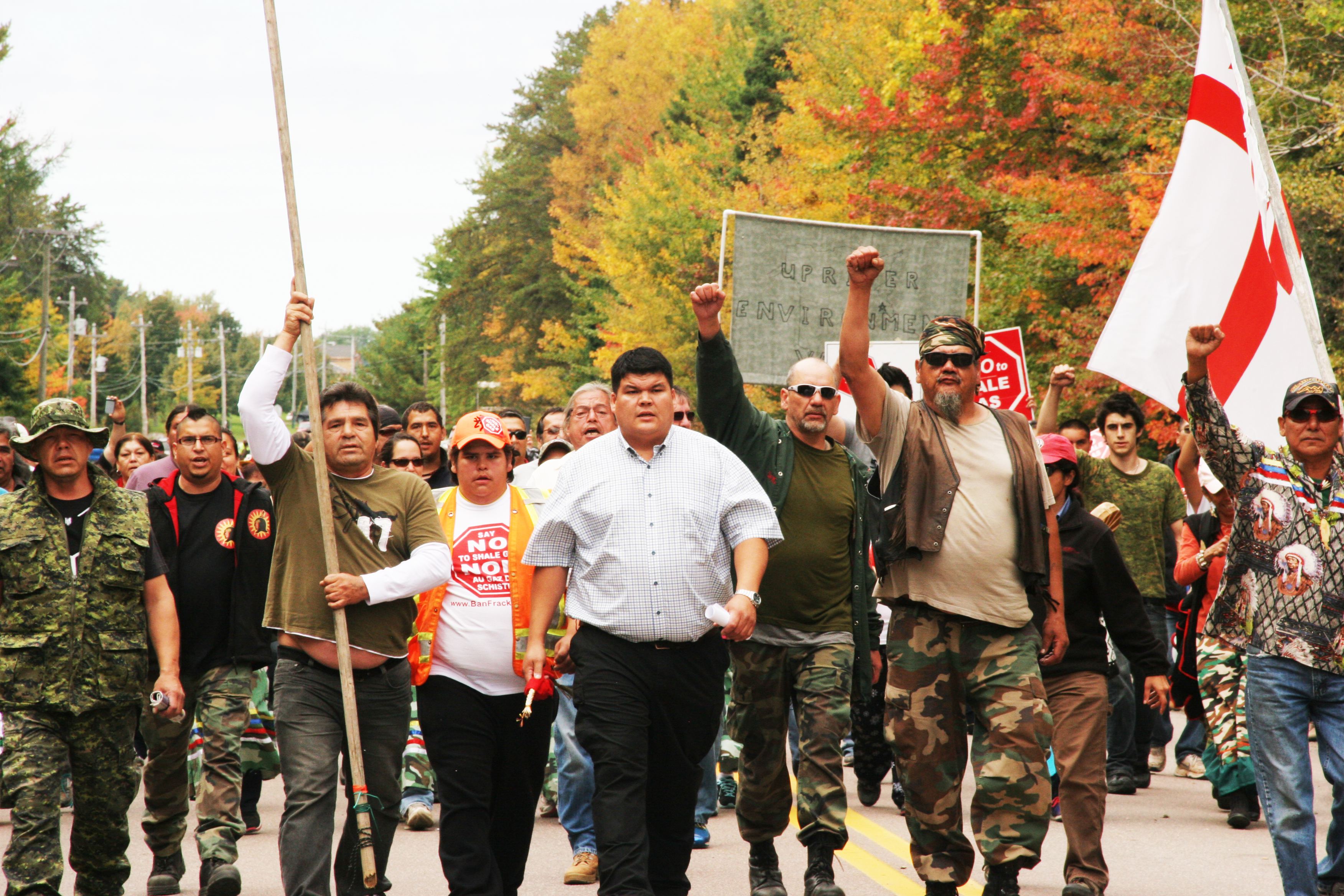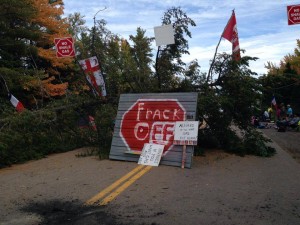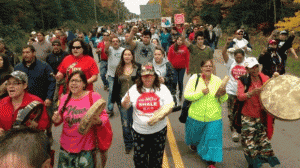by Steve da Silva – Co-produced with Two Row Times

Chief Aaron Sock (center, button-up shirt) of the Elsipogtog First Nation flanked by warriors and protesters after declaring that his community is reclaiming all unoccupied Crown Lands, which comprise much of modern day New Brunswick. Photo Credt: Miles Howe of the Halifax Media Coop.
After months of arrests and mounting resistance against shale gas exploration in New Brunswick on Mi’kmaq territory, the anti-fracking movement upped the ante this past week with a fresh blockade and a proclamation of a massive land reclamation, which has forced conservative New Brunswick Premier David Alward to a negotiation table with representatives of the anti-fracking movement.
A day after the September 30 blockade was established on Route 134 that blocked the entrance to an equipment storage site of SWN Resources Canada, Chief Aaron Sock, speaking for Chief and Council of the Elsipogtog First Nation, announced a sweeping Mi’kmaq land reclamation effective immediately.
“Harper and the Conservative government have lifted restrictions to environmental protections of our lands and water” and “the provincial government is turning over all lands… to a corporation for their own benefit… we have lost confidence in governments for the safekeeping of our lands.”
Sock added that “our notice of eviction has been completely ignored by the Provincial government and Southwest Energy, and… we have been compelled to act to save our water, land and animals from ruin.”
“Let it be known to all the we as the chief and council of Elsipogtog are reclaiming all unoccupied reserve lands… We have been instructed by our people that they are ready, willing, and able to go out and stake their own claims on all unoccupied lands for their own use and benefit.”
The October 1 announcement, which came on their Treaty Day, was read at the blockade site to an exuberant crowd of hundreds who gathered from across Kent County and beyond.
 The New Brunswick government has been allowing SWN Resources to explore some 2.5 million acres of lands for the purpose of shale gas extraction through hydraulic fracturing, or “fracking”. Fracking involves drilling deep wells that fracture shale rock beds and requires the pumping of millions of gallons of pressurized fresh water and toxic chemicals, including known carcinogens and neurotoxins, into a well to force the gas out. However, the provincial government’s case for hydraulic fracturing took a huge blow this past September when Louis LaPierre, the researcher at the New Brunswick Energy Institute who wrote the report encouraging the government to proceed with gas exploitation,
was discovered to have lied
for decades about having a PhD in Ecology.
The New Brunswick government has been allowing SWN Resources to explore some 2.5 million acres of lands for the purpose of shale gas extraction through hydraulic fracturing, or “fracking”. Fracking involves drilling deep wells that fracture shale rock beds and requires the pumping of millions of gallons of pressurized fresh water and toxic chemicals, including known carcinogens and neurotoxins, into a well to force the gas out. However, the provincial government’s case for hydraulic fracturing took a huge blow this past September when Louis LaPierre, the researcher at the New Brunswick Energy Institute who wrote the report encouraging the government to proceed with gas exploitation,
was discovered to have lied
for decades about having a PhD in Ecology.
On Wednesday, October 2, a new Brunswick court issued an injunction against the blockade at the request of SWN, which is enforceable until October 12, 2013. But the papers have yet to be served by the RCMP, and Miles Howe of the Halifax Media Co-op has reported that the RCMP would not enforce an injunction until dialogue with the Premiere had ceased.
On Sunday, October 5 Premier Alward and three members of his cabinet met with and the Elsipogtog chief and 15 representatives of the protesters for three hours in a Moncton hotel, with negotiations continuing in Fredericton as of Monday. The delegation reportedly excluded the Mi’kmaq Warriors Society, who Alward would not meet with, and who have reportedly been the main and most visible force at the blockade. The Warriors are independent of the Chief and Council.
Two Row Times asked Elsipogtog counsellor Robert Levi whether the negotiations that had opened up related to the blockade or the larger land reclamation, and Levi told us that “I think the [reclamation] is a larger issue that will take on a life of its own. But since we have an injunction hanging over our heads, this is what needs to be resolved right now, since we want a peaceful resolution to the blockade and for no one to get hurt.”
On October 7, the Mi’kmaq Warriors Society took their own initiative and hand-delivered a letter (via a Houston-based environmentalist group) to SWN Resources reading, “all projects, leases, and permits issued to SWN Resources by the Government [of New Brunswick] come to a halt until all Mi’kmaq-L’nu, and Wabanaki communities, as sovereign individuals are Meaningfully Consulted, and that we are able to come to an informed decision as individuals.”
 All the while, the Acadian presence in the anti-fracking movement and at the most recent blockade has also been quite strong, which many see as a welcome development between the two communities. Fourteen years ago, the crisis of Burnt Church unfolded 100 km to the north, where non-native fishers destroyed thousands of Mi’kmaq lobster traps to protest native fishing rights, which was followed by violent confrontations. However, Acadians and Mi’kmaq have also had strong of unity against a common oppressor in the region’s history. After the mass expulsion of the French-speaking Acadian people by the British in 1755, the remaining Acadians and the Mi’kmaq made a treaty that saw the two peoples unite in a guerilla war against the British that led to the
1757 defeat of a British detachment in 1757 in the Battle of Bloody Creek.
All the while, the Acadian presence in the anti-fracking movement and at the most recent blockade has also been quite strong, which many see as a welcome development between the two communities. Fourteen years ago, the crisis of Burnt Church unfolded 100 km to the north, where non-native fishers destroyed thousands of Mi’kmaq lobster traps to protest native fishing rights, which was followed by violent confrontations. However, Acadians and Mi’kmaq have also had strong of unity against a common oppressor in the region’s history. After the mass expulsion of the French-speaking Acadian people by the British in 1755, the remaining Acadians and the Mi’kmaq made a treaty that saw the two peoples unite in a guerilla war against the British that led to the
1757 defeat of a British detachment in 1757 in the Battle of Bloody Creek.
Comments